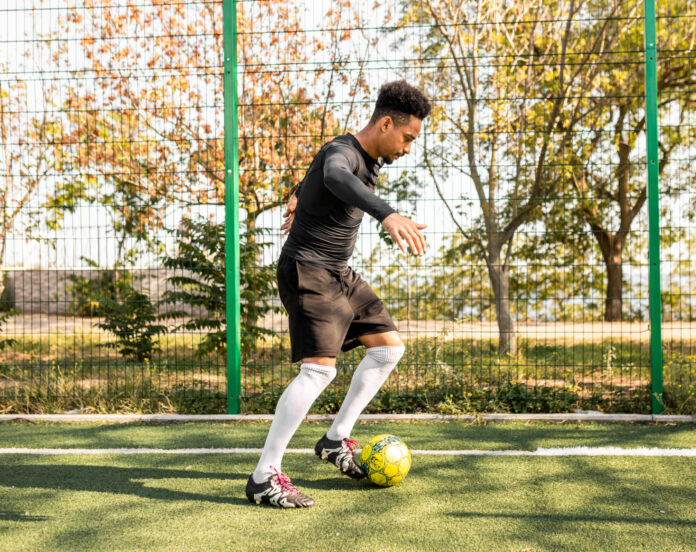Football Workout Routines are essential for athletes aiming to maximize their performance on the field. These routines are designed not only to build strength and endurance but also to improve agility, speed, and mental focus. Football demands a combination of explosive power and sustained energy, so having a well-structured workout plan is crucial for peak performance.
Professional footballers emphasize targeted workouts that simulate real-game intensity. Sprint drills, resistance training, and functional exercises all contribute to a player’s ability to perform under match conditions. By integrating these exercises consistently, players can enhance their physical capabilities while reducing the risk of injuries.
Strength Training for Footballers
Strength is the foundation of any effective Football Workout Routine. Players need strong legs for powerful kicks, a solid core for balance, and upper body strength for duels and tackles. Squats, lunges, deadlifts, and bench presses form the core of strength training. Incorporating functional exercises such as Bulgarian split squats, medicine ball throws, and pull-ups helps replicate movements experienced during matches.
Top players like Cristiano Ronaldo and Virgil van Dijk follow structured strength programs focusing on compound movements. These exercises engage multiple muscle groups simultaneously, improving coordination, stability, and overall power. Strength training also plays a key role in injury prevention by stabilizing joints and reinforcing ligaments.
Endurance and Stamina Building
Endurance is critical for maintaining performance over a full match. Football requires bursts of high-intensity activity interspersed with periods of lower intensity, making stamina training essential. Interval training, including repeated sprints with recovery periods, mimics these match conditions. Long-distance running develops aerobic capacity, allowing players to sustain energy throughout 90 minutes.
Circuit training that blends cardio and strength exercises is an effective way to improve overall conditioning. Exercises like burpees, push-ups, and kettlebell swings performed in circuits replicate the varied intensity of football. Mental endurance also benefits from stamina training, helping players stay focused during challenging match situations.
Agility and Speed Drills
Agility and speed are central to a footballer’s success. Quick changes in direction, acceleration, and deceleration are constant throughout a match. Ladder drills, cone drills, and shuttle runs enhance coordination, foot speed, and reflexes. Plyometric exercises like box jumps and lateral hops develop explosive lower-body power, essential for sprinting and jumping.
Incorporating reaction-based drills, such as responding to visual or auditory cues during sprints, further improves a player’s ability to anticipate and react to opponents. Speed and agility training ensures players can maintain their pace while staying balanced and controlled under pressure.
Core Stability and Balance
A strong core supports every movement on the field. Core exercises, including planks, Russian twists, and medicine ball rotations, improve stability and posture. Balance training, using tools like BOSU balls or stability discs, enhances coordination and helps prevent injuries during sudden changes in direction.
Core strength also translates to better kicking power, stronger headers, and improved shielding from opponents. Elite players integrate core and balance training seamlessly into their routines, understanding that it is essential for overall football performance.
Recovery and Injury Prevention
Recovery is a critical part of any Football Workout Routine. Proper rest, stretching, and mobility work reduce muscle soreness and enhance flexibility. Foam rolling and dynamic stretching routines help maintain muscle elasticity and prevent strains.
Nutrition and hydration are equally important. Consuming protein-rich meals supports muscle repair, while adequate hydration ensures optimal cardiovascular function. Periodic rest days and active recovery sessions allow players to perform at their best during training and matches.
Mental Fitness and Focus
Physical training alone is not enough. Mental preparation is key to peak performance. Visualization techniques, mindfulness exercises, and goal-setting help players stay focused under pressure. Football requires quick decision-making, and mental agility ensures players can react appropriately to game situations.
Combining mental conditioning with physical routines enhances overall performance, enabling players to sustain concentration, anticipate opponents’ moves, and make strategic plays during crucial moments.
Sample Weekly Football Workout Routine
A typical week may include three strength sessions, two endurance-focused sessions, one agility and speed session, and daily core work. Recovery sessions should be incorporated after high-intensity workouts. Each training day targets different aspects of performance, ensuring balanced development and avoiding overtraining.
For example, Monday could focus on lower-body strength and plyometrics, Wednesday on endurance intervals and cardio circuits, Friday on upper-body strength and core, while agility and reaction drills can be sprinkled throughout the week.
Nutrition Tips for Peak Performance
A footballer’s diet must support their intense training regime. Balanced meals rich in lean proteins, complex carbohydrates, and healthy fats provide sustained energy. Pre-training meals should focus on carbs for fuel, while post-training meals emphasize protein for recovery.
Hydration is crucial, especially during long training sessions or matches in hot conditions. Electrolyte-rich drinks help maintain fluid balance and prevent cramps. Supplements like omega-3 fatty acids or multivitamins can also support joint health and overall performance.
Importance of Consistency
Consistency is the key to benefiting from Football Workout Routines. Sporadic training may lead to fitness fluctuations, increased injury risk, and slower performance gains. Following a structured weekly plan, tracking progress, and gradually increasing intensity ensures steady improvement.
Professional footballers maintain discipline, treating every training session as a building block for long-term success. Consistency, combined with proper recovery and nutrition, is what separates elite players from average athletes.
Read also:
jamshedpur fc vs kerala blasters standings
east bengal fc vs mumbai city fc lineups
kerala blasters vs northeast united fc timeline
mumbai city fc vs fc goa lineups

